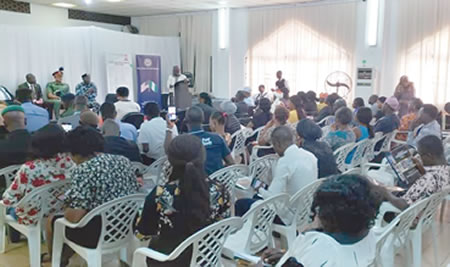In a gathering that was the first of its kind, communities within Oyo state and stakeholders came together last week in Ibadan to chart a new course in fighting human rights violations and infringements on the people of the state especially from people that are covered by the law.
The gathering was the maiden edition of the Oyo State Human Rights Stakeholders Summit which held at the American Corner Jericho, Ibadan and was put together by the Oyo state office of the National Human rights Commission.
It drew people from all walks of life including religious bodies, community leaders, government agencies and parastatals, the military and para-military bodies, non governmental agencies, the media and educational institutions.
The no-hold-barred summit allowed participants to put military, paramilitary and government agencies on the hot seat and ask how they curb extremism in their officers and how they can control their officers to ensure issues of abuses become a thing of the past.
Speaking during the summit, the Executive Secretary of the National Human Rights Commission (NHRC), Anthony Ojukwu Esq. represented by the Oyo state coordinator of the NHRC, Oyindamola Bamgbose Esq. declared that the Oyo state office of the commission had since its creation in February, received about 115 complaints on human rights violation which it had handled using human rights based approach.
He explained that the issue of low financing is a major challenge to fighting for sustenance of human rights adding that the situation has changed for the better with the increment of the commission’s budget by the Federal Government.
The summit themed, ‘State of human rights in Oyo state’ not only brought together relevant stakeholders in the promotion and protection of human rights in Oyo state to facilitate a system approach that will address human right violation issues within the state after exploring a broad range of issues around human rights as it relates to their work but also created a platform for them to collaborate and create a united front against human rights abuse and violation.
In his keynote address, the Head of Communication and Language Arts Department, University of Ibadan, Prof. Ayo Ojebode, stated that though there aren’t enough statistics to examine the rate of right violation in Oyo state, there are instances that could be cited, adding that stakeholders have a role to lay in promoting human rights.
According to him, human rights are indivisible, universal as well as interdependent and for every individual that has fundamental rights, there are also obligations because in expressing individual rights, one is not allowed to infringe on other peoples’ rights.
Prof Ojebode stated that the government cannot be left alone to promote and uphold human rights, reiterating the importance of each individual playing its role.
“Schools should teach children basic the basics of human rights, create debate platforms for them to learn and argue about human rights, teachers and school management must be a model of promoting human rights because children do not listen to what we say, they watch what we do. Also there must be engagement of neigbourhood associations, mobile human rights advocacy and media engagements,” he stated.
There were three panel discussions during the summit; civil and political rights panel which had the General Officer Commanding of the 2Division of the Nigerian Army represented by Brigadier General K.O. Ozewenge, the Zonal Director of the Economic and Financial Crimes Commission (EFCC), Friday Ebelo and representatives of the Immigration Service, National Drug Law Enforcement Agency and the Directorate of State Service as panelists.
Ebelo urged parents to inculcate good moral values into their children while the anchor of the second session, Edem Ossai urged government to be proactive in giving information to the people.
There was also a panel on economic, social and cultural rights with the Commissioner for Lands, Housing and Urban Development, barrister Rahman Abdulraheem; representative of the Commissioner for Women Affairs and social inclusion and a representative of the Federal Road Safety Corp as panelists. There was a last session on women, children and vulnerable groups.
The participants agreed that stakeholders need to collaborate to sensitise people about their rights and the options available for them in upholding such rights while they emphasised the need for people to know that every right comes with obligations that must also be upheld.




